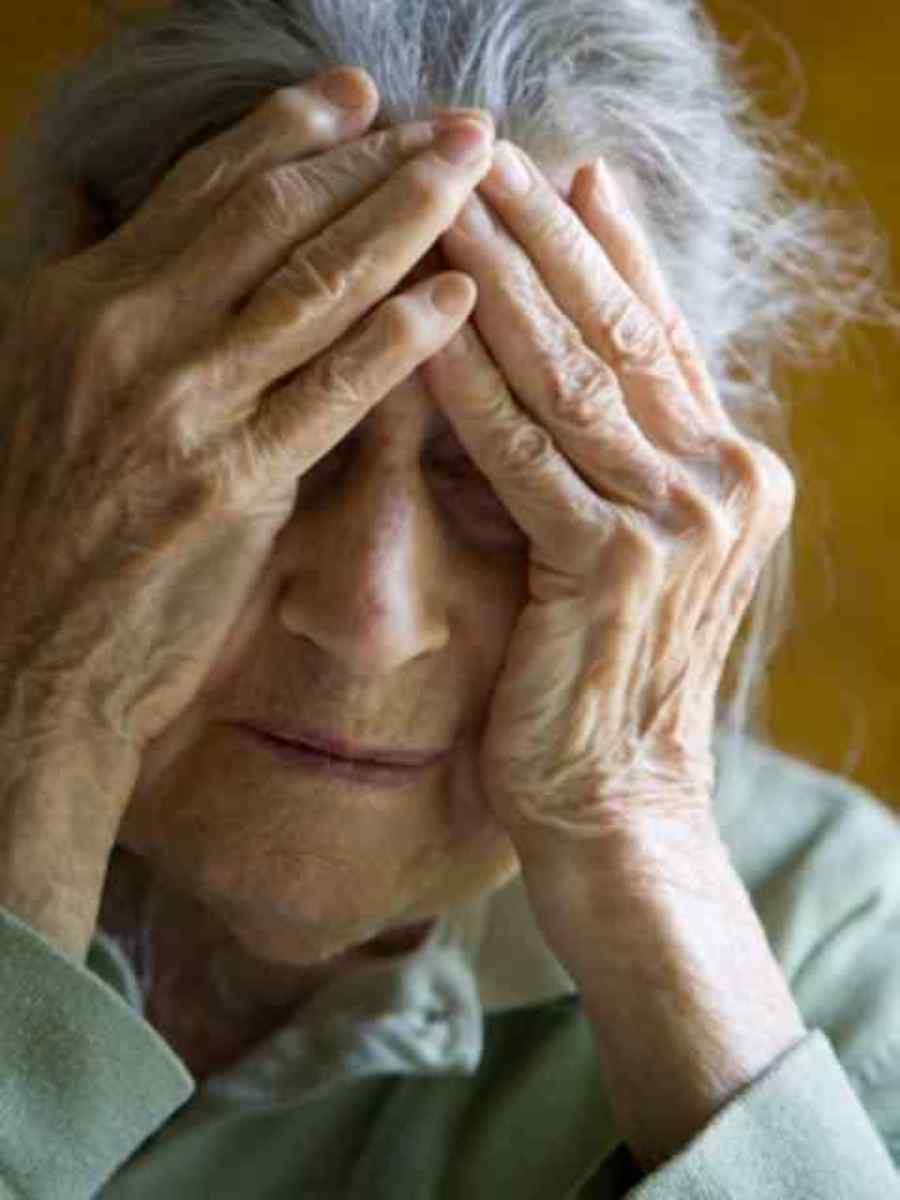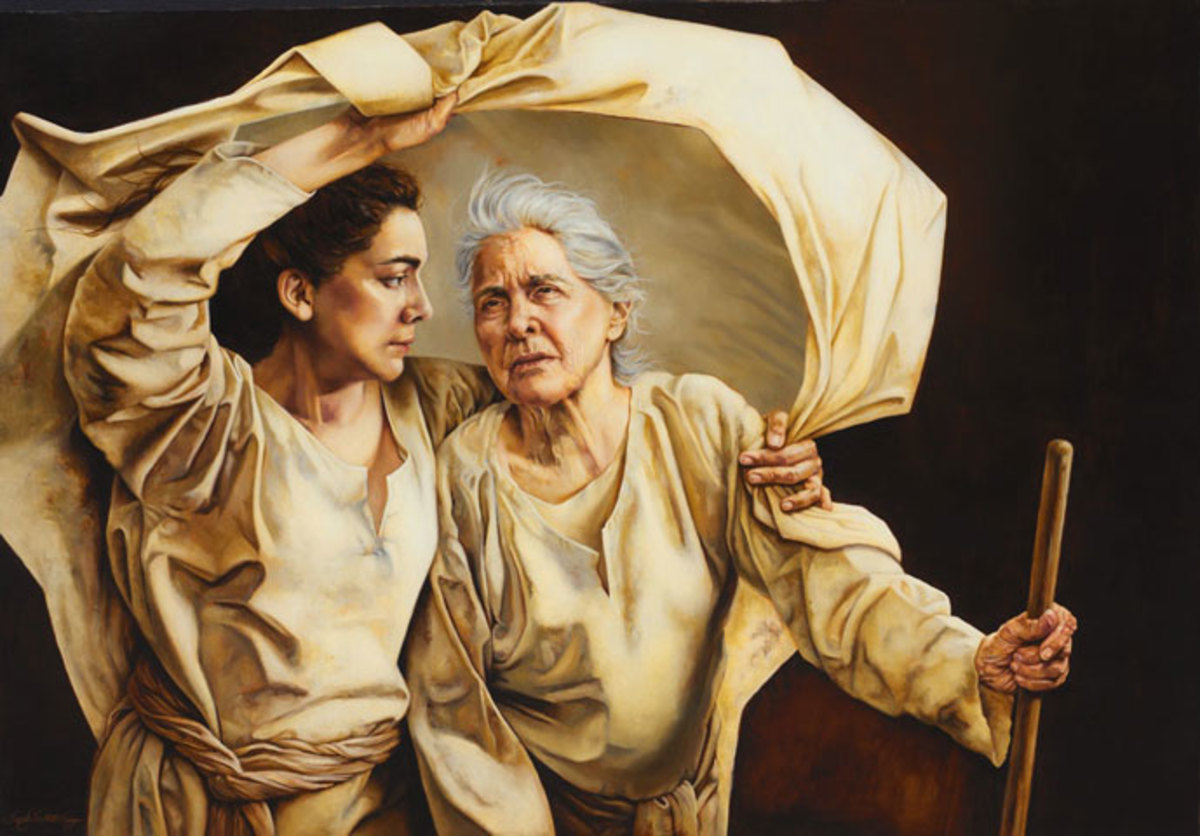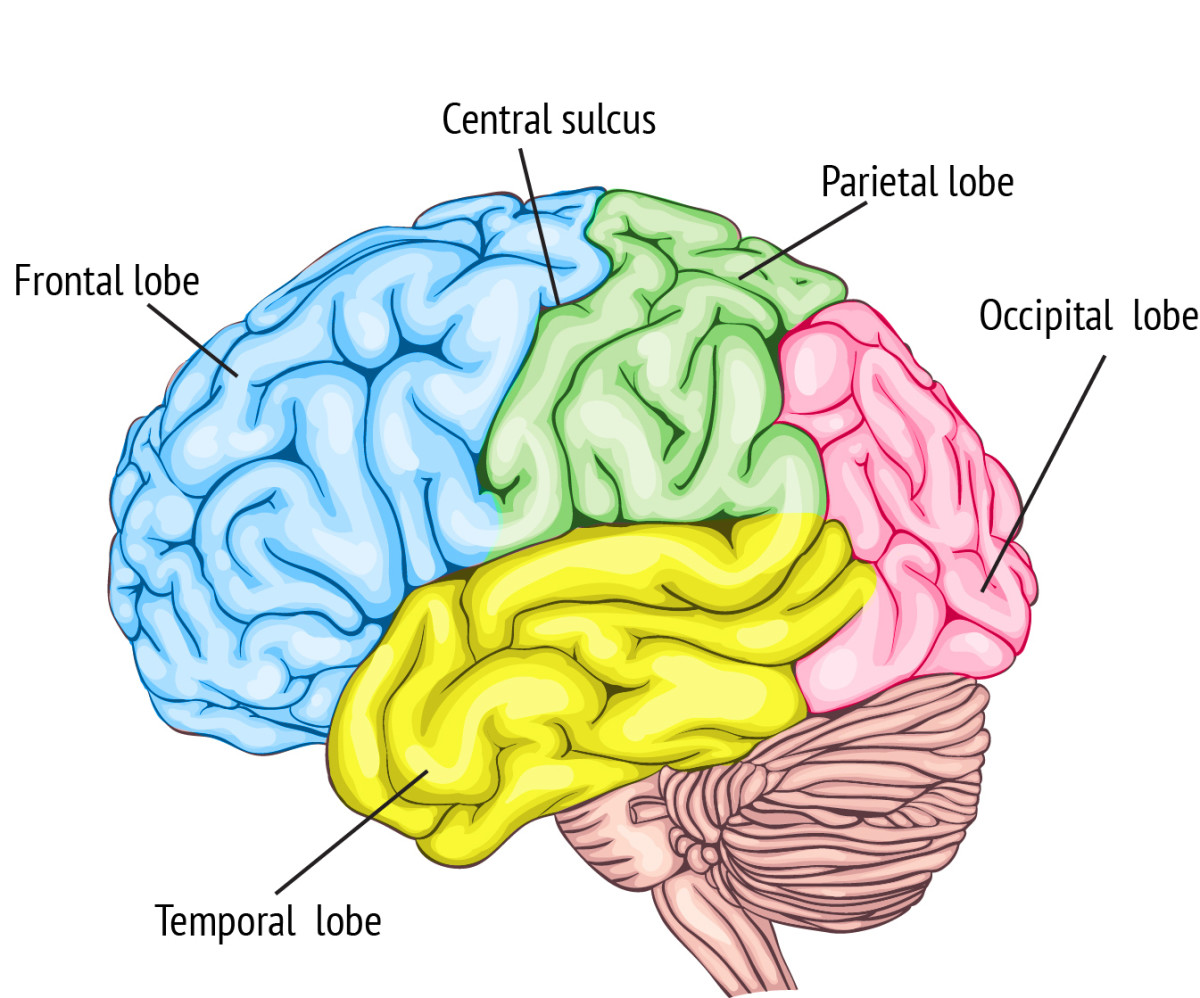On the Road With Dementia

The Shock and Surprise of Dementia
It was July of 1997, and I was still in the beginning months of being back at home with my mother. I had made the decision to leave my job (as an assistant professor at the University of Florida), to not apply for tenure at work, and to go home to do what I could to care for my mother because I had learned something was very wrong, and I knew someone needed to be there with her. My aunt, my mother's sister, had told me mother had been showing signs of having forgotten people and things she should not have been struggling to remember, and she was worried enough about my mother to get in touch with me about her concern.
I wasn't happy at work, and, for years I'd been disappointed in my decision to move to Florida five years earlier. So, even though it was time for me to make a major life decision, it was actually a very easy decision for me to make. But when I first got home, I was new to seeing my mother in the condition she was in. I desperately wanted things to be the way they had always been whenever I was home for a visit, and, the longer I was home, I wanted this with every fiber of my being. But, I soon found out and had to try my best to accept the truth. Even though I think I always knew—and just did not want to accept that my aunt was right: something was definitely wrong with Mama.
At that time, I didn't know anything at all about dementia or memory loss. In fact, those words were not yet part of the vocabulary my siblings and I used when thinking or talking about her condition. All I knew at the time was that I wanted my mother to be herself again. In my naivety, I was just trying to think of something I could do to make her happy. Somehow, I thought if I could make her happy, things might go back to normal.

Maybe all she needed, I thought, was a change of pace. I knew it was 1995 the last time she’d visited me while I was teaching at the university, in Florida. She hadn’t been anywhere in a while, other than a few trips to Texas to see either my older sister who lived, at that time, in Houston, or my younger sister who lived in Dallas.
So, I decided to take Mama on a trip. We’d go to Seattle and Tacoma, Washington, to visit her two favorite nephews. Seattle was one of the places I was thinking about possibly moving to once I left Mississippi, so it would be a fact-finding trip for me, and a once-in-a-lifetime chance for my mother to see where her two handsome and wealthy nephews lived. Their mother, my mother’s oldest sister, had passed away in 1992, and although my first cousins visited my mother often, this would be mother’s first-ever visit to see them. Maybe a trip was just what she needed, I told myself, to refresh her mind and to rejuvenate her spirit. Little did I know at that time, a trip was actually the last thing she needed.

Living (and Going on Vacation) With Dementia
Most of our trip was okay. There were a few snags and happenstances, but for the most part, things went well. We visited one of my first cousins one day, the other the next. We spent time in Gig Harbor, where one first cousin lived, and found it to be a serene and peaceful community where a lot of sports stars lived. We spent the night in my first cousin’s beautiful home, and we spent a lot of time with him and his wife. He showed us his yard, his flower gardens, antiques and relics he’d collected since leaving Mississippi decades earlier, and we were surprised to find out that many of his most treasured treasures were actually from Mississippi. Then we visited my other first cousin (brother to the first), a former sports star who had become a track coach at the University of Puget Sound. At the university's Baker Stadium, the school’s “Peyton Field” is actually named in my cousin's (Joseph Calvin Peyton) honor. We spent hours visiting my cousin's home, and his front porch in Tacoma, we could see Canada’s snow-topped Mount Rainier.
After visiting in Tacoma , mother and I spent time in Seattle. I rented a car and we went to the zoo, went shopping, and I even drove to Redmond so that we could get a look at Bill Gate’s mansion. We saw a lot of sights, and had a pretty good time, most of the time during our visit—before returning to Mississippi.

The 12-hours of travel back to New Orleans (flying and waiting in airports) and then the three-hour drive home to Mississippi turned out to be very hard on my mother. I’d wanted the trip to be one that she would love and remember forever, but I found out as I drove home from the airport that night that her mind was probably not going to cooperate with my plan.
“This is not the way to my house,” she started saying over and over as I drove away from the airport. She was tired, I knew, from our trip. The flight from Seattle to Phoenix had taken more than twelve hours, and now I had retrieved my car from the airport in New Orleans and was driving using directions I knew. I had driven this route several times before, so I knew where I was going, and I kept telling myself she would calm down as soon as she rested a bit.
As I drove out of the city she was still saying I was going the wrong way, and that I was getting us lost. I tried to reason with her, but she insisted I was trying to trick her. She didn’t know why, she said, but for some reason I was not taking her to her home. I was tired too from our trip, and after a while, I wanted to cry. I didn’t know what to do. Something was wrong with Mama, and it was dark and I was driving, so there wasn’t much I could do. I stopped at a service station. After filling the tank, I asked her if she would like to ride in the back seat, so she could lie down and take a nap if she wanted to. She climbed into the back seat, and I breathed a sigh of relief. Maybe she would calm down.

The Worrisome Way Home—With Dementia
Back on the road, only a few minutes passed before she started again. “This is not the way to my house,” she said. “Why are you doing this? Where are you going? This is not the right way.”
“It is the right way, Mama,” I said. “This is the way home. This is the road that will take us to I-55, and I-55 is the road home.”
“No,” she said. “You were supposed to turn at that little church. Didn’t you see that little church? When you go the right way, you see that little church. And then you turn at that little church. We passed right by it, so you’re going the wrong way. Why won’t you listen to me? This is not the way to my house.”
Oh my God, I thought, wondering if I would be able to keep my wits about me while driving, with her going on like that. I could see her in the rear-view mirror, and her face was filled with nothing but fear and worry. She was angry and frightened, and it was no joke. She really thought I was not taking her home. She really thought I was supposed to turn at a little church, and since I hadn’t, she was sure I was not taking her home. It was clear to me now she was serious, and she was not going to stop.
“What little church?” I asked trying to force her to remember correctly. “What little church are you talking about?”
“You know that little church,” she said. “We always see it when we drive home from that airport. You know it, and you know we always turn at that little church. I don’t know why you won’t take me home.”

It took a while for me to finally realize it wasn’t going to help, at all, for me to say anything. So I got quiet. I drove on into the darkness of the Louisiana night, on the verge of tears the rest of the way home. I only spoke when I knew I could say, without crying, “We’ll be home soon, Mama. I promise I’m taking you to your house.” But she still didn’t let up, and she continued to insist I was not taking her home.
I thanked God when we crossed over into Mississippi on our night's journey. Hours after leaving the airport in New Orleans, finally, we arrived at home. I looked into the back seat, and Mama was looking through the window at her home, smiling.
“See?” I said, “I told you I was bringing you home.”
She laughed. It was clear to me she was surprised, but glad, to be home. I took a deep breath and exhaled, hard. I was glad to know she remembered her home when she saw it. The next morning, to my surprise, she apologized to me for the way she’d behaved the night before. She said she must have been overly tired from our trip. She even laughed at herself and about what she had said to me. We talked about our trip and how much we enjoyed it, and she even tried on the new things I got for her in Seattle. I was glad to know she remembered our trip. Little did I know, what happened on the drive home from New Orleans was just the beginning of many more “episodes” I would go through with mother over the next few weeks and months. We were home from our journey to Seattle, but we were not home from the journey into dementia.
Several months after our Seattle trip, I arranged for someone to look in on my mother while I flew to Chicago to interview for a faculty position at Roosevelt University. I was gone only a few days, but by the time I got back home, Mama's condition had worsened, and I had to turn down the job after it was offered to me.
After that, I knew my plans for myself had to change. Before taking my mother to a doctor to get medicine for whatever was wrong with her mind—the medicine that I hoped would make her herself again, I found out I first had to help her get through completing cataract surgery that had been started the previous year.
I had known about the previous surgery, but didn’t know she would need a second surgery. She hadn’t remembered to tell me that. The procedure had been performed on only one eye while I was still living in Florida, and now her other eye had to have the procedure. So, my plans changed accordingly. I would help her get ready for the cataract surgery, and then, after allowing the time she would need to recover from that, I would begin taking her to even more doctors to find out what was wrong with her mind.
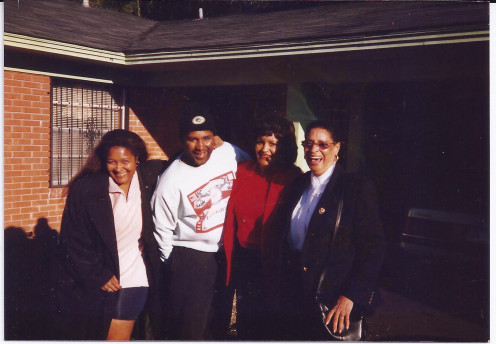
Coming to Terms With Dementia ...
Coming to terms with the idea that your loved one is changing, and won't be changing back, can be stressful and difficult. For this reason, education is of critical importance in preparing to cope with the demands of someone with dementia. Not understanding the needs of a loved one with this condition can lead those who care for them to have unrealistic expectations. In the beginning, I had such expectations because I lived every day in hope that my mother was just going through something "temporary," and that she would soon get back to normal.
For a while, for me, it seemed there was good reason to have such hope. After we got back from our trip to Seattle, and after that torturous journey home from the New Orleans airport, and after she was completely healed from her cataract surgery, I took my mother to a doctor who diagnosed her dementia. That doctor prescribed a "cholinesterase inhibitor" drug called Aricept, and once mother began taking it, her condition improved tremendously. In fact, for the next two years, most days she seemed very close to being "her old self" (right up until she fell, in 1999, and had to be put on medications related to having undergone hip replacement surgery, medications which seemed to interfere with the benefits of Aricept).
My mother passed away in 2000 after finally being diagnosed with late-stage brain cancer. Still, what I went through in the years when her doctors thought her condition was caused by dementia, taught me a lot about caring for someone with memory loss.
Lessons Learned and Help for Loved Ones With Dementia ...
In the years when I thought dementia was my mother's primary problem, I learned that it is important to understand that your loved one is changing, and that things are not likely to "go back to normal." In the beginning months after I moved back home in 1997, Mama had a hard time understanding why I was there with her. She'd lived alone for a long time, so she was not used to having anyone living with her. This was well before she was put on Aricept, and my being at home with her was a source of confusion while she was struggling every minute with her memory.
I did my best, every day, to help her understand that my being there was necessary. I'm not sure she ever agreed with me on that, but she finally accepted it. Still, some days when she was questioning me about why I was there, even I started to feel like maybe I shouldn't have been there. I began to think, based on her constant confusion, that maybe her life would have seemed more "normal" to her, had I not been there.
I soon found out--the hard way, that my being there was critical to mom's safety. You see, I actually saved her life one day.
When I arrived home in 1997, I had a fairly new Pontiac Bonneville—a very nice car, of my own. It was only several months from being paid off, but being home with my mom, I had no income, so I was forced to sell it. That meant I had to drive my mother's much older car, and there was always something wrong with it, but I needed it to take my mother to her doctor's visits, and to get groceries and run other household errands. So, in addition to caring for my mother 24/7, by myself, I also had to do all I could to keep her old car in working condition.
One day, my cousin Vickie picked me up and took me to run errands after I'd dropped my mother's car off to be fixed, once again. My cousin had left her son, then a young teenager, there with mother. As teenagers will do, he soon found a way to enjoy being my mother's "babysitter." With my permission, he spent most of his time in my room playing computer games on my computer. My mother, a Queen of keeping her home neat and tidy, went to work in the kitchen cleaning and shining things to perfection.
To this day, I'm still thanking God that my cousin Vickie and I returned home when we did. As soon as I opened the front door to go inside the house, the overwhelming odor met me. The front rooms of the house were filled with gas! Vickie and I both knew what the odor was immediately, and we got to work. My cousin held open the front door so that fresh air could go inside, and I ran inside, got my mother and Vickie's son out of the house, and then I went back in and turned all the burners on the stove to "Off."
Vickie's son said he never smelled the gas, probably because it simply had not had time to get built up strongly in all the back rooms of house. My mother, who said she did not smell the gas at all (months later we found out she'd lost her sense of smell), said she'd been cleaning the stove. It was always clean, but she liked it to keep it polished until it was shining like new. She told us she thought she'd turned the burners all the way off, but she had actually bypassed "Off," and had turned them all on "High."
I learned it is important, in the earliest stages of the disease as possible, to make sure someone in your family is "selected or elected" to manage your loved one's health-care needs. Get a durable Power of Attorney (POA) for health care, at least. I obtained a POA that covered health care and financial matters. My mother was already involved in settling a property dispute before I came home to care for her. Since that was the case, it was relatively easy for me to get Power of Attorney for her. In fact, her lawyer suggested it, and she willingly assigned it to me so that I could take the lead, for our family, in managing settlement of the property dispute (which I was able to handle, and I'm proud to say my mother was very pleased with the outcome of my handling of the dispute).
I also learned about the vital importance of caregivers taking care of themselves. It is easy to forget that your health is of paramount importance when, every day, your main concern is your loved one's health. However, when you think about it, if you're the primary caregiver, your health has to be more important. It's like when you're on the airplane and the flight attendants tell you in cases where you need to use the oxygen masks, if you have a child with you, you need to put on your oxygen first, before attending to your child's mask.
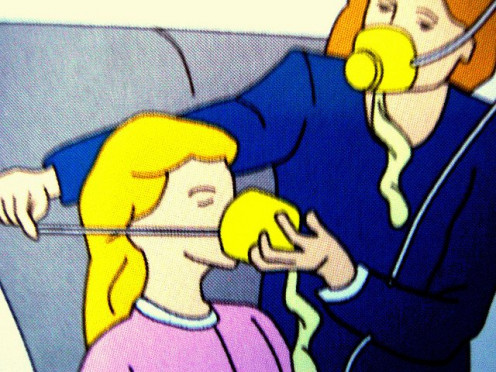
Why is it so important to put your mask on first? Because if you don't you could faint from lack of needed amounts of oxygen, and then you won't be available to care for your child or yourself. It's the same thing when you're a primary caregiver. If you allow your health to deteriorate when caring for a loved one with dementia or any other chronic and progressive condition, you run the risk of not being either physically or mentally "there" in a way that will allow you to take the best possible care of them. As caregiver, you need to do all you can to maintain your mental and physical health.
One thing you can do to give yourself some needed "respite" care, is to identify someone who can relieve you from time to time. Even if only for several hours, one day a week, relief can provide you with time to see to some of your own needs while giving you needed time away from the demands of caring for your loved one. If you're like me, you'll be tempted to feel "guilty" about needing time away, but don't.
Taking some well-earned, well-deserved, and desperately needed time away will only help to refresh and strengthen you, mind and body, making you more prepared to take the best care of your loved one. As my mother's condition worsened, I was able to set up regular visits through home-health. Even though I had to be there in the home while the health-care worker was there, I was able to get regular, needed help with caring for my mother after she fell, and after she was diagnosed with brain cancer.
Last, but Not Least ...
Because of what I went through, I understand why the idea of a loved one having dementia is a scary thing to have to face. Still, the sooner you face it, the earlier you can begin to learn what you need to know about it. Becoming educated early on is the best way to be prepared for many of the behavioral "challenges" you and your family and/or caregivers will face. Following are some of the best "bullet points" I can leave you with, if you are facing a challenge similar to the one I faced:
- Always know that your loved one's safety is of paramount importance.
- Try to find out/identify if there are precipitating factors related to the dementia. This is also very important. Even though I had asked, several times, that a CAT scan be done on my mom, my request was ignored by my mother's doctor. It wasn't until I took her to another doctor, many doctors and many hospitals later, that one was done, and it was discovered that she had end-stage brain cancer.
You might also enjoy, by this same author:
- And, finally, identify available community resources, before you need them. This, you'll find, will be extremely helpful. Some communities will have Adult Day Care service providers. If you're able to take advantage of such services, even if only on a temporary basis, this option may be one you should consider. It could provide the "respite" you will need to give yourself, in order to maintain your own mental and physical well being.
Copyright, 2013, Sallie B. Middlebrook, Ph.D., all rights reserved.
This content is accurate and true to the best of the author’s knowledge and is not meant to substitute for formal and individualized advice from a qualified professional.
© 2013 Sallie B Middlebrook PhD


